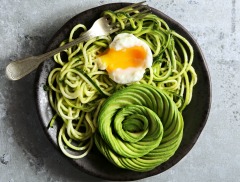Don't just meal plan... meal plan intelligently - with Meal Genius! Sign up for our free newsletter to get delicious recipes, sample meal plans and a whole lot more!
Turkey
Once reserved for Thanksgiving, turkey is now a mainstay at the American table. In fact, about two hundred and sixty five million turkeys were produced in 2006.
While male, or tom, turkeys can reach up to 70 pounds, the female, or hen, turkey usually weighs from 8 to 16 pounds.
It is important to choose pasture-raised organic turkeys that are fed their natural diet, free of pesticides or chemical fertilizers. Also, when buying prepared turkey (deli style), make sure it is free of preservatives like nitrites.
Turkey is an excellent source of protein, selenium, vitamin B6 and niacin.
The Benefits
- Special diets: Autoimmune Paleo Diet, Candida Diet, Diabetic, Elimination Diet, Gluten-Free Diet, Gluten-Free/Dairy-Free Diet, Grain-Free Diet, High Protein Diet, Low Acid Diet, Low Carb Diet, Low FODMAP Diet, Low Histamine Diet, Low Oxalate Diet, Low Starch Diet, Paleo Diet (Light), Paleo Diet (Strict), PCOS Diet, Primal Diet, Thyroid Diet, Whole Food
- Excellent Source of: Protein, Selenium, VitaminB6, Niacin
- Good Source of: Zinc, Phosphorous
- Preferences: No Corn, No Yeast, No Peanuts, No Molds, No Coconut, No Pseudograins, No Citrus, No Nightshade, No Legumes, No Fish, No Red Meat, No Pork, No Eggs, No Shellfish, No Gluten, No Nuts, No Seeds, No Soy, No Dairy, No Grains, Low Carbohydrate, Low Fat, Low Sodium, Low Sugars, Low Saturated Fat
Related Foods
Related Nutrients
Selecting and Storing
Turkey is available fresh (raw and prepared) as well as frozen. Follow the instructions on individual packages to ensure freshness.









